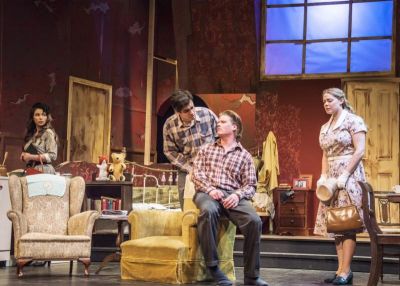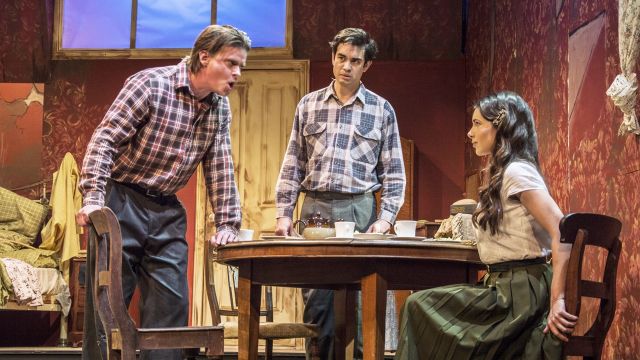Look Back in Anger
“That voice that cries out doesn't have to be a weakling's does it?” Jimmy’s anguished appeal to his wife Alison in John Osborne’s famous play Look Back in Anger.
Look Back in Anger follows a young husband and wife, Alisonand Jimmy Porter, as they attempt to steer their way through class conflict and deal with a crumbling marriage in 1950s England.
It is arevealing look at class, sex, politics, and the conventions of 1950s England, all from the point of view of angry youth.
Osborne had five marriages, all unhappy, except for his last. He drew inspiration from his personal life and failing marriage with Pamela Lane when writing Look Back in Anger.
The play (written in 17 days in a deck chair on Morecambe Pier) was adapted into a motion picture of the same name, starring Richard Burton and Mary Ure.

The question arises, do the themes in this iconic play remain relevant in today’s society?
The simple answer is yes. Class divide still remains to some extent and abusive relationships are sadly still prevalent. As an audience we are left wondering why Alison decides to return to Jimmy after verbal and possibility unseen physical abuse.
Director Lesley Reed* has decided to play the three-act play as two acts, with acts 1 and 2 played as the first half. A good decision in a way, as two intervals would make the play extremely long. However, even with editing, the first half still runs well over an hour which tests the audience’s concentration. Further editing of some of the longer monologues would have helped this to some degree.
Her work as director is evident right from the beginning; black and white projections on a scrim setting, the mood supplemented with Kim Orchard’s 50s jazz underscoring. Her set concept (along with Brittany Daw’s set design and Richard Parkhill’s lighting) makes good use of the Arts Theatre stage and creates a composite set with attention to detail, particularly the props.

Adam Tuominen as Jimmy Porter carries the weight of the show. We find him constantly abusing and cursing society but unable to make any changes and it is this helplessness that makes him angry. Damaged from incidents from his childhood and teens, he vacillates between tirades and genuine love for his wife Alison. Tuominen handles the immense amount of dialogue with expertise. One feels for Jimmy as the world does not live up to his expectations. The difficulty with this role is that constant ranting can cause the audience to ‘turn off’ or dislike the character of Jimmy, ignoring his softer moments. This, however, is the nature of the script, not Tuominen’s performance.
Leah Lowe as Alison, Jimmy’s wife, perfectly embodies a woman ‘living on the edge’ never knowing what may happen next. She endures more than most people could bear and yet returns to him to show she has undergone great suffering. Her face when she is enduring Jimmy’s tirades is heartbreaking to watch, torn between her love for him and her inability to help him change.
James Edwards' Cliff is complex. He is the peacemaker even if it means putting himself down. Welsh is an extremely difficult accent and Edwards does not waver. He maintains the difficult balance of being Jimmy’s friend and a relationship with Alison that is part friendship and part sexual (without the intimate physical intimacy).

Jessica Carroll’s Helena could be construed as the play’s moral compass as she does the honourable thing by leaving when Alison returns. While Carroll handles this difficult role well, her constant looking away from the character talking to her was distracting at times and causes her to seem distant and removed.
Jack Robins' Colonel Redfern (Alison’s father) is truly the voice of reason in the play. He shows a real understanding for Jimmy and his plight. Robins gives a compassionate performance, understated, showing the Colonel’s caring for both his daughter and son-in-law.
My only reservations with this production are the faux aging of some of the set (in particular the doors), the length of the first half (difficult to fix though) and some of the accents changing as the play develops.
All in all, Look Back in Anger still has a pertinent message for all of us, the way we perceive the world, the way we treat each other and is still an quintessential piece of English theatre!
Barry Hill
*Lesley Reed is a reviewer for Stage Whispers
Subscribe to our E-Newsletter, buy our latest print edition or find a Performing Arts book at Book Nook.

